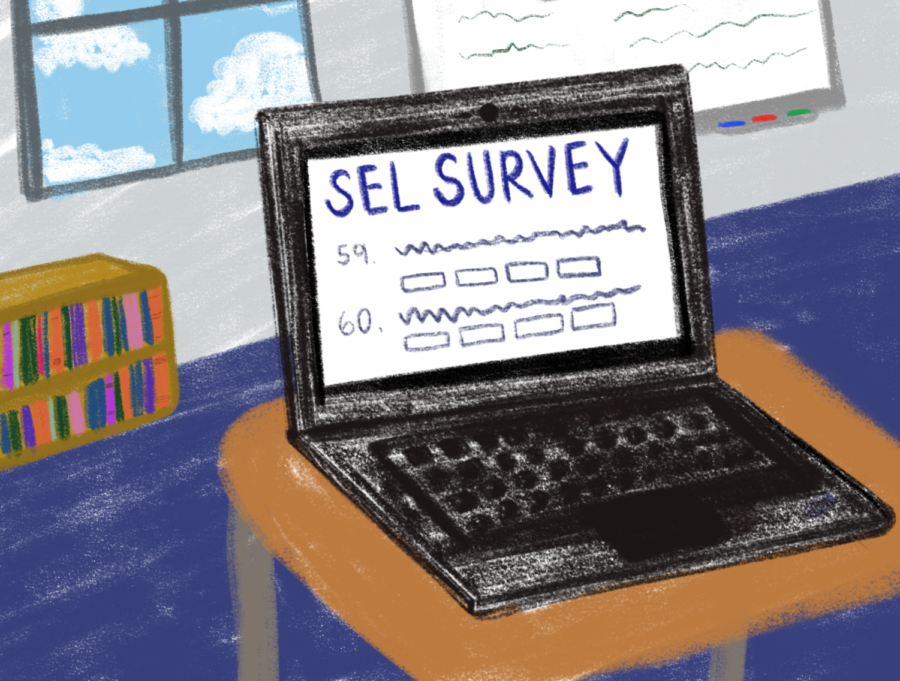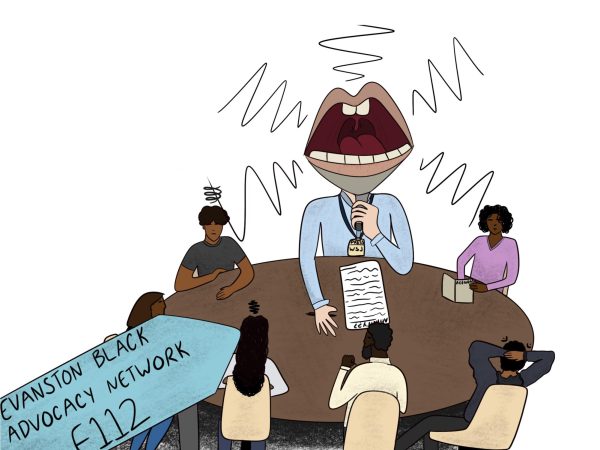Opinion | SEL surveys don’t capture depth of student experience
Social Emotional Learning surveys, or SELs, have become a staple of PE classes at ETHS. On Mondays, during 33-minute classes, students take surveys about mental health and coping mechanisms.
The administration undoubtedly had good intentions when incorporating surveys about mental health into the curriculum, but unfortunately, the surveys are not structured well enough to make a considerable impact, and they often come off as condescending or ignorant about the struggles that students face.
For example, the surveys begin with questions about general life for students. Students are asked various questions about school and then are asked to choose one answer ranging from Extremely Satisfied to Extremely Dissatisfied. This is where the first problem becomes apparent: most of the questions are about school life. Even though students spend approximately eight hours at school and the rest of their time at home, the questions about school are more specific and detailed, leading some survey-takers feeling as if the administration cares about their identity as students more than their identity as people.
Continuing with the complete lack of understanding for students, many of the survey questions use oversimplified versions of problems students have, which comes off as patronizing.
An example of a recurring question is a fictional story about a boy named Bart who felt anxious and upset after thinking that his friends are making fun of him. These kinds of conflicts do happen among high schoolers, but the questions never go any deeper than that, which makes it seem like the survey makers think that is where students’ problems start and end.
Using these kinds of shallow questions also eliminates the possibility of anything new coming out of these surveys. In the end, taking the surveys every week is a very repetitive experience. The survey asks ten questions about school and maybe three questions that are more focused on home and personal life. The students are asked to rate their emotions by intensity on a percent scale. Then, the students are advised to recontextualize their thoughts, take deep breaths or have honest conversations with those who have upset them. It isn’t anything that we haven’t heard before. Many students feel that these are methods that they’ve been learning for a long time and that reviewing them once a week in a short gym class isn’t going to make any noticeable difference in students’ mental health.
“I think anything they have in there about how to deal with your emotions is just common knowledge. These are methods that could be useful if you do them, but just a survey in gym class isn’t going to make people start,” says junior Bennett Gottesman.
Many students feel like the surveys should be made optional or eliminated altogether. “I feel like they should just make it optional, and then they’d get rid of it, because they’d realize that [most] of the school doesn’t want to do them anyway,” says junior Jeanelle Jones.
Jones isn’t alone in her perspective about the surveys. Many students feel that the surveys are useless, mostly because few answer them seriously.
“I think it’s something that people just don’t care about and won’t start caring about even if it’s incredibly well done,” Gottesman says, who feels that even fixing the repetitiveness of the survey wouldn’t fix the main problem, which is that students just don’t care about giving honest, detailed answers. “Maybe if there was more variety, it would be more helpful, but I think it wouldn’t change the real problem that people just don’t do it.”
There is a more detailed alternative to the weekly surveys. Every few months, students log onto Surveymonkey to take a much longer survey. However, many students find that this survey is actually too detailed, since it is over a hundred questions long and incredibly exhausting. It also asks repetitive and accusatory questions, including asking students what kind of drugs they take and how often they take them. It is a well-known fact among students that people do not answer accurately, and often, those surveys are joked about in class.
“How many people are honest on those? I think those are probably more useful for the state to get a sense of what people are up to, but I know people who didn’t answer honestly because they didn’t want to incriminate themselves or who lied because they thought it was funny,” Gottesman says.
Although mental health has undoubtedly worsened for high schoolers over the years and was definitely made worse by COVID, ETHS cannot fix this crisis by sending out surveys. Instead, the administration should make a meaningful effort to reach out to students who are struggling and make it easier for them to seek help. For example, making the ETHS social workers more accessible to students would make a more meaningful impact and send a more meaningful message than the SEL surveys.
Your donation will support the student journalists of the Evanstonian. We are planning a big trip to the Journalism Educators Association conference in Philadelphia in November 2023, and any support will go towards making that trip a reality. Contributions will appear as a charge from SNOSite. Donations are NOT tax-deductible.








